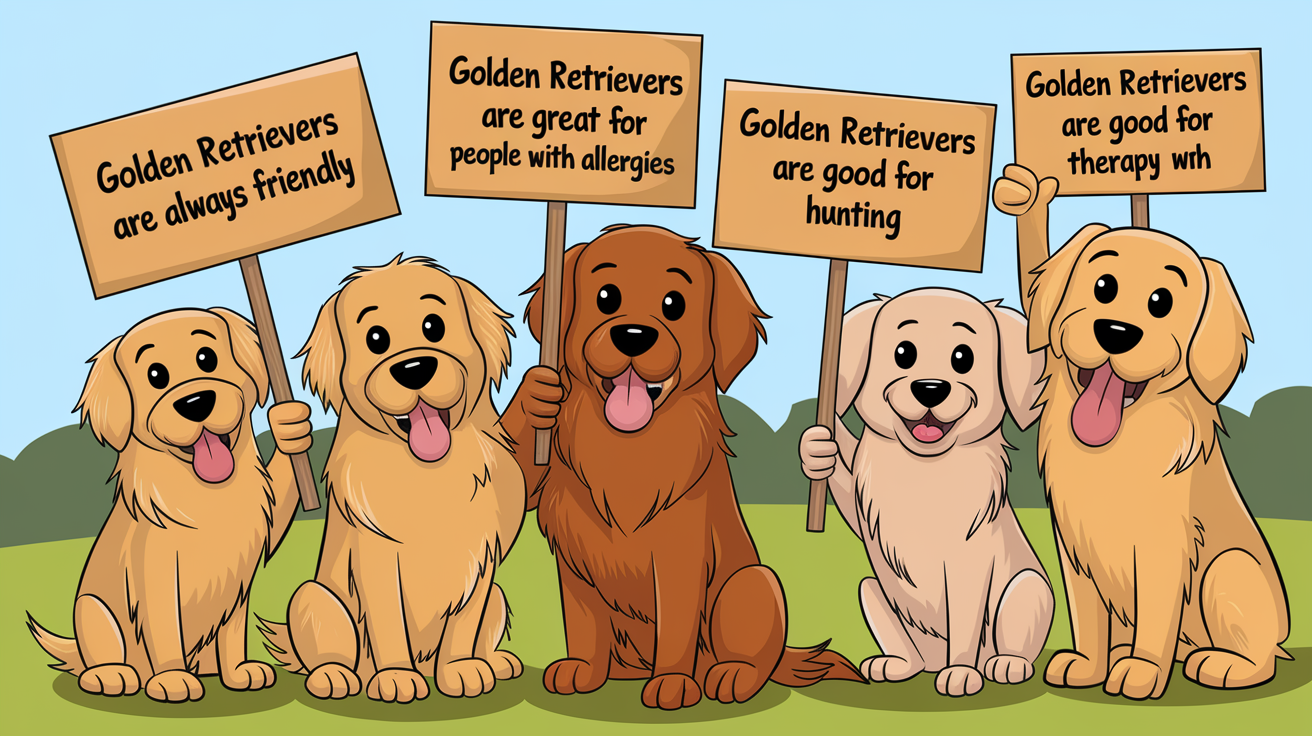5 Common Myths About Golden Retrievers. Golden Retrievers have captured the hearts of many with their friendly and loyal nature, becoming one of the most adored dog breeds worldwide. Despite their popularity, many myths and misconceptions still surround these golden-coated companions.

Why do these myths persist about such a well-loved breed? It might be due to their widespread fame and the tendency for stories to evolve over time.
As these myths are explored and debunked, it opens up a clearer understanding of what life with a Golden Retriever truly entails.
1) Golden Retrievers Always Smile
Golden Retrievers are often thought to possess an ever-present smile. This belief is mostly due to their friendly, open-mouthed expressions. Many owners interpret this appearance as a smile, reflecting the dog’s happy nature.
It’s a delightful sight to see a Golden Retriever wagging its tail, mouth slightly open, appearing genuinely pleased.
Yet, not every open-mouthed look from these dogs is a sign of happiness. Sometimes, Golden Retrievers show their teeth when they feel stressed or threatened. This isn’t a common occurrence but can happen if they sense danger. In such cases, their body language may appear intense and focused.
Among dog lovers, Golden Retrievers are known for their joyful demeanor. Whether they’re playing in a park or relaxing at home, their expressions can communicate excitement and contentment. These expressions often lead to the perception that they are always smiling.
Golden Retriever Society explains that understanding these expressions helps in recognizing the pet’s mood. Owners often find that a Golden’s “smile” is one of the many charming traits that make them beloved companions.
2) Golden Retrievers Are All Perfect Swimmers
Not every Golden Retriever is a natural-born swimmer, even though many have traits that make them good at it. People often imagine these dogs as effortlessly gliding through the water. They certainly have features like a water-repellent coat and strong legs, but this doesn’t automatically make them perfect swimmers.
Just like humans, dogs need practice to improve their swimming skills. Younger Golden Retrievers might be too weak or cautious, and even older ones may prefer staying dry on certain days.
It’s important to start training them young, ideally between two and five months old, as they build confidence and muscle strength.
Every dog is unique, and some may even develop swimmer’s ear, a common condition where water gets trapped in their ears, leading to infections. Owners should be mindful of these risks and ensure their furry friends have a safe swimming experience.
Getting to know their pet on an individual level is vital for owners. A Golden Retriever might love a splash, or they might be content being land lovers. So, don’t be surprised if one Golden Retriever loves the water while another rather stays on the shore. They each have their own preferences and personalities.
3) Golden Retrievers Don’t Need Grooming

Some people believe that Golden Retrievers are low-maintenance when it comes to grooming. It’s easy to think their coats require only occasional attention, but this isn’t true. Their fur is longer than it seems and needs regular care. Grooming helps keep their coat shiny and healthy.
Golden Retrievers have a double coat, which means they shed a lot. Regular brushing helps control shedding and prevents mats from forming. Without it, fur can get tangled and uncomfortable for the dog. Consistent grooming also helps keep dirt and debris out of their fur.
Grooming sessions also help build a bond between the dog and owner. It can be a calming experience for both, turning into a routine they enjoy together. Spending this time together regularly can strengthen their relationship.
Even though grooming might seem like a chore, it’s crucial for their health. Routine care prevents skin problems and keeps their ears and nails in good shape. It’s more than just a beauty routine, it’s necessary for their well-being.
For those interested in more about grooming needs, iHeartDogs provides some useful insights. Regular grooming is important for happy and healthy Golden Retrievers.
4) Only Golden Retrievers Are Friendly

Golden Retrievers are famous for their friendly nature, but they’re not the only breed known for friendliness. Many people believe only Goldens have this trait, which isn’t true. Breeds like Labradors, Beagles, and even some mixed-breed dogs can also be incredibly friendly and loving companions.
Picture a Labrador wagging its tail enthusiastically when meeting new people. Labs are often as sociable as Golden Retrievers, greeting everyone like a long-lost friend. This shows that friendliness is not restricted to one breed. A dog’s behavior often depends on its training and environment.
Consider also the personality of a Beagle. Known for curiosity and playfulness, Beagles can charm just about anyone. They might not have the same golden coat, but their warm personality shines through, forming bonds with their families and strangers alike.
What about mixed breeds? Some might assume they’re unpredictable, but many are extremely friendly and loyal. Shelter dogs often show their joy and affection when given a loving home.
The belief that only Golden Retrievers are friendly neglects the unique personalities of other dogs. Each pup, no matter the breed, has its own way of spreading joy and love.
5) Golden Retrievers Are Not Good Guard Dogs

Golden Retrievers may not be your first choice if you’re looking for a guard dog. Their friendly and gentle nature makes them great companions, but it doesn’t make them great protectors. These dogs are more likely to greet intruders with a wagging tail than a bark that would deter them.
While loyalty is usually a desirable trait in a guard dog, Golden Retrievers are known to be loyal in a different way. They aim to love and please, creating strong bonds with their family. This is wonderful for home life but not ideal for a guarding role where firmness and sometimes aggression are needed.
Golden Retrievers also lack the aggression typically found in breeds like Rottweilers or German Shepherds. They are playful and goofy, which can be endearing but not intimidating. In fact, their size can be misleading; while they’re as large as some guard breeds, their temperament is much softer.
According to The Smart Canine and other sources, these traits make them unsuitable for a guard dog role. They’re not likely to alert you with a loud bark, unless it’s for play. So, if you’re in the market for a guard dog, you may have to look elsewhere.
Understanding Golden Retrievers

Golden Retrievers are beloved for their gentle nature and friendly demeanor. Their history reveals fascinating origins, while their temperament showcases their adaptability as both family pets and working dogs.
History and Origin
Golden Retrievers were developed in the late 19th century in Scotland. The breed was created by crossing yellow retrievers with the now-extinct Tweed Water Spaniel. Their purpose was to retrieve game from water and rough terrain after hunting. This lineage gives them their dense, water-resistant coats and excellent retrieving skills.
Their ancestry reflects the dedicated work of breeders like Lord Tweedmouth, who aimed for a dog with loyalty and intelligence. Over the years, they have gained enormous popularity around the globe and are cherished for their adaptability to various roles, from companions to therapy dogs.
Temperament and Behavior
Known for their calm and friendly nature, Golden Retrievers are great with families and kids. They are social animals, desiring interaction with humans. This sociability makes them poor choices for those who aren’t home often, as they may develop separation anxiety.
Golden Retrievers excel in obedience and are eager to please, making training straightforward. Their playful attitude remains even as they age, bringing joy to those around them. They can adapt to various environments, like helping in search and rescue missions. These skills underscore their versatility and why they’re one of the most popular breeds worldwide.
Health and Care Tips
Golden Retrievers require thoughtful care to stay healthy and happy. Understanding their diet, nutrition, and exercise needs can enhance their lives and strengthen the bond with their owners.
Diet and Nutrition
Golden Retrievers thrive on a balanced diet full of essential nutrients. A mix of high-quality proteins, healthy fats, and carbohydrates can support their energy and growth. Choosing a diet rich in vitamins and minerals helps maintain their shiny coat and strong bones.
Owners often wonder about the best feeding practices. Meal portion control is crucial to prevent obesity, a common issue with this breed. Puppy food should differ from adult food, as a puppy’s nutritional needs change as they grow. Consult a vet to create a personalized plan, adjusting based on age, activity level, and health conditions.
Experimenting with ingredients can be rewarding. Adding fish oil to meals, for example, can boost joint and skin health. A friend once shared how her Golden Retrievers’ coat improved after including fish oil, making walks even more enjoyable with compliments from strangers.
For diet adjustments, track the dog’s weight and energy levels, making changes as needed. Check labels for ingredients and avoid those with fillers or artificial additives. A little planning goes a long way in ensuring they get the nutrition they need.
Exercise Requirements
Exercise is not just fun but essential for Golden Retrievers. They are energetic and thrive with regular, varied activities.
A daily walk, running in the yard, or even playing fetch can keep them mentally and physically fit.
Puzzles and agility courses challenge them, while walks provide a chance to explore and socialize.
Golden Retrievers that don’t get enough exercise might exhibit destructive behaviors, like chewing on furniture. I once knew a Golden that ate a couch cushion after a week of rain limited their outdoor time.
Tailoring exercise to fit a Golden’s personality is key. Some enjoy swimming, while others love a simple game of fetch.
Aim for at least an hour of activity each day, varying routines to keep it exciting. Not only is this a chance to bond, but it also maintains their weight, reduces stress, and promotes a long, healthy life.









